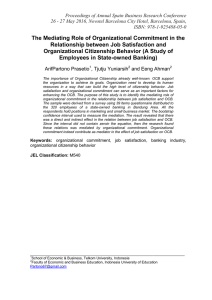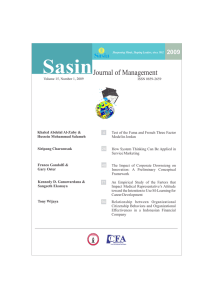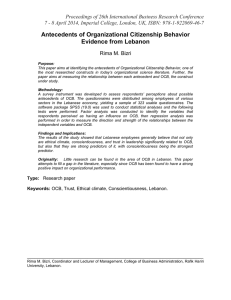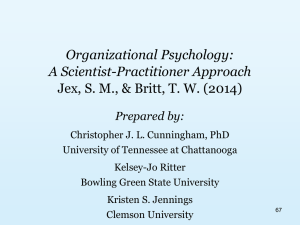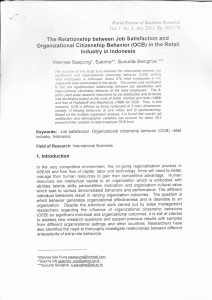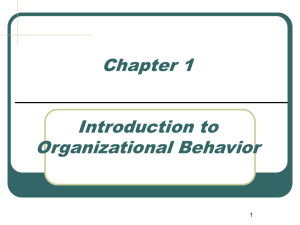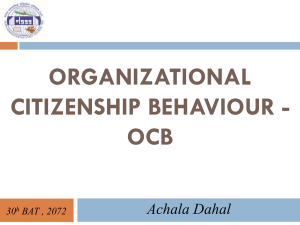World Applied Sciences Journal 19 (6): 795-799, 2012 ISSN 1818-4952 DOI: 10.5829/idosi.wasj.2012.19.06.1569
advertisement
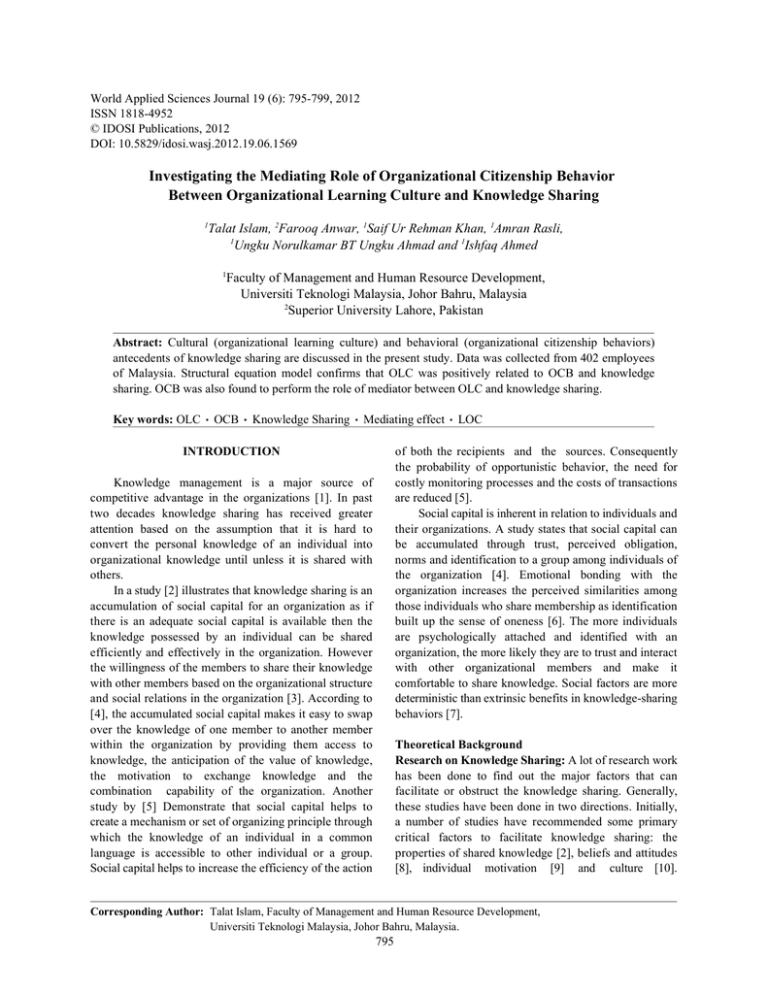
World Applied Sciences Journal 19 (6): 795-799, 2012 ISSN 1818-4952 © IDOSI Publications, 2012 DOI: 10.5829/idosi.wasj.2012.19.06.1569 Investigating the Mediating Role of Organizational Citizenship Behavior Between Organizational Learning Culture and Knowledge Sharing 1 Talat Islam, 2Farooq Anwar, 1Saif Ur Rehman Khan, 1Amran Rasli, 1 Ungku Norulkamar BT Ungku Ahmad and 1Ishfaq Ahmed 1 Faculty of Management and Human Resource Development, Universiti Teknologi Malaysia, Johor Bahru, Malaysia 2 Superior University Lahore, Pakistan Abstract: Cultural (organizational learning culture) and behavioral (organizational citizenship behaviors) antecedents of knowledge sharing are discussed in the present study. Data was collected from 402 employees of Malaysia. Structural equation model confirms that OLC was positively related to OCB and knowledge sharing. OCB was also found to perform the role of mediator between OLC and knowledge sharing. Key words: OLC OCB Knowledge Sharing Mediating effect INTRODUCTION LOC of both the recipients and the sources. Consequently the probability of opportunistic behavior, the need for costly monitoring processes and the costs of transactions are reduced [5]. Social capital is inherent in relation to individuals and their organizations. A study states that social capital can be accumulated through trust, perceived obligation, norms and identification to a group among individuals of the organization [4]. Emotional bonding with the organization increases the perceived similarities among those individuals who share membership as identification built up the sense of oneness [6]. The more individuals are psychologically attached and identified with an organization, the more likely they are to trust and interact with other organizational members and make it comfortable to share knowledge. Social factors are more deterministic than extrinsic benefits in knowledge-sharing behaviors [7]. Knowledge management is a major source of competitive advantage in the organizations [1]. In past two decades knowledge sharing has received greater attention based on the assumption that it is hard to convert the personal knowledge of an individual into organizational knowledge until unless it is shared with others. In a study [2] illustrates that knowledge sharing is an accumulation of social capital for an organization as if there is an adequate social capital is available then the knowledge possessed by an individual can be shared efficiently and effectively in the organization. However the willingness of the members to share their knowledge with other members based on the organizational structure and social relations in the organization [3]. According to [4], the accumulated social capital makes it easy to swap over the knowledge of one member to another member within the organization by providing them access to knowledge, the anticipation of the value of knowledge, the motivation to exchange knowledge and the combination capability of the organization. Another study by [5] Demonstrate that social capital helps to create a mechanism or set of organizing principle through which the knowledge of an individual in a common language is accessible to other individual or a group. Social capital helps to increase the efficiency of the action Theoretical Background Research on Knowledge Sharing: A lot of research work has been done to find out the major factors that can facilitate or obstruct the knowledge sharing. Generally, these studies have been done in two directions. Initially, a number of studies have recommended some primary critical factors to facilitate knowledge sharing: the properties of shared knowledge [2], beliefs and attitudes [8], individual motivation [9] and culture [10]. Corresponding Author: Talat Islam, Faculty of Management and Human Resource Development, Universiti Teknologi Malaysia, Johor Bahru, Malaysia. 795 World Appl. Sci. J., 19 (6): 795-799, 2012 Nevertheless, it is not viable to explain knowledge sharing by one single factor or a few factors. Therefore, another group of studies attempted to create a conceptual model, combining multiple factors and/or clarifying the relationships among these factors from an integrative and comprehensive perspective [7,11]. For example, [4] suggest three dimensions of social capital: relational, structural and cognitive. Dispersion of knowledge is swift by mutual trust among knowledge-sharing partners (relational), effective system for communication (structural) and shared norms across an organization (cognitive). A structural framework was constructed and tested by [7] in accordance with the theory of reasoned action and conclude that intention of an individual to share knowledge is influenced by his or her attitudes and subjective norms (as well as organizational climate), which subsequently influence that individual’s attitude toward sharing knowledge. A study by [11] Provides a comprehensive literature review on knowledge sharing in organizations. She identifies four major factors affecting the knowledge sharing of individuals including the nature of knowledge, individual motivation to share, opportunities to share and the culture of the work environment. behavior, according to [17], is not an enforceable requirement of the role or the job description, that is, the clearly specifiable terms of the person’s employment contract with the organization; the behavior is rather a matter of personal choice, such that its omission is not generally understood as punishable. (p. 4) OCB is vital for productivity but organizations cannot forecast the entire spectrum of subordinate behaviors needed for achieving goals through stated job descriptions [18,17] Identified the following five categories of OCB i.e. (1) Altruism, (2) civic virtue, (3) conscientiousness, (4) courtesy and (5) sportsmanship. A researchers [19] Suggest that OCBs play an important role in the development of social capital in organizations. Their conceptual framework indicates that OCBs include loyalty, obedience and participation, all of which contribute to the creation of the structural, relational and cognitive aspects of social capital [4]. OCBs are expected when the actors are more emotionally attached to an organization with which they have membership. As [20] suggested salient identification enhances frequency of cooperation and cooperative behaviors. When individuals identify with their organizations, they are more willing to engage in cooperative, altruistic and spontaneous unrewarded citizenship behavior [21,22] Learning Organization Culture: [12] Defines culture as “a pattern of basic assumptions, invented, discovered, or developed by a given group” (p. 7). The culture of an organization creates high levels of behavioral consistency in members through social norms, shared values and a shared mental model [13]. The organization whose motive is to become a learning organization needs to develop appropriate characteristics that are required for the organization-wide learning practices. Learning organization refers to “an organization skilled at creating, acquiring and transferring knowledge and at modifying its behavior to reflect new knowledge and insights” [14, p. 80]. A learning organization involves an environment in which organizational learning in an organization is structured so that teamwork, collaboration, creativity and knowledge processes have a collective meaning and value [15,16] Framework for an organizational learning culture (OLC) has served as a theoretical base for this study. Hypothesis Development: Previous researchers have found positive association between OCB and organizational culture [23,24] defines contextual performance as the efforts of employees not directly related to their main tasks but is important because they benefit the organization. And argued that this contextual performance influenced by the organizational culture. Employee’s perception of supportive culture enhances their OCB [23]. Social exchange theory also suggests the same that when employees perceive that their organization supports them they show citizenship behaviors. In the presence of learning culture employee’s focus on long term (continuance) improvement rather than immediate outcomes [12]. H1: OLC is positively related to OCB. The importance of cultural aspect in the field of knowledge management cannot be ignored. Few studies have found a positive relationship between organizational culture and knowledge sharing. Thus, organizational culture is one of those important constructs which use, Organizational Citizenship Behavior: OCB refers to employee behaviors that are discretionary, beyond the call of duty and not rewarded in the context of an organization’s formal reward structure [17]. Discretionary 796 World Appl. Sci. J., 19 (6): 795-799, 2012 Organizational Learning Culture: Scale regarding OLC was developed by [16]. Using the same scale the construct was considered as valid by [29]. Later on the scale was reduced up to seven items by [30] containing one item for each dimension and reported its reliability ranging from 0.68 to 0.83. Using the same scale in the present study 0.84 reliability was founded. A sample item included “In my organization, whenever people state their view, they also ask what others think.” create and share knowledge [1] and create such environment which motivates individuals to share their knowledge with others [25]. H2: OLC is positively related to knowledge sharing. According to [26] knowledge sharing is a form of OCB and the process of Knowledge sharing involves altruistic, discretionary, automatic and behaviors that are not requested. They further concluded that in effective environment knowledge sharing can be created through OCB. Another researcher [27] suggests that knowledge sharing is the outcome of citizenship behaviors. RESULTS Table 1 illustrated standard deviation, mean and correlation among the variables. The mean score of OLC (M=3.40), OCB (M=3.37) and knowledge sharing intentions (M=3.61) were slightly above neutral. This showed that employees were slightly agreed regarding these variables. OLC and OCB were found to be highly correlated with each other (r=0.58, P<0.01). This shows that learning support from the organization increases employee’s citizenship behaviors. OLC and employee’s intentions to share knowledge were also found to be positively and significantly related (r=0.42, P<0.01). In addition, OCB was also found to enhance intentions to share knowledge among employees (r=0.39, P<0.01). H3: OCB positively related to knowledge sharing. MATERIALS AND METHODS Sample and Procedure: The present study was based on the survey on banking employees of Malaysia. A total of 500 questionnaires were distributed among employees of banking sector on the basis of simple random sampling technique. Out of questionnaires 424 responded back (response rate = 84.8%). On final evaluation 22 questionnaires were found to be incomplete and excluded from the data (effective response rate = 80.4%). Respondents were evaluated on the basis of their age, gender, qualification, income and marital status. Average age of the respondents was 31 years. 76.8% of the respondents were married and 71% of them were females. While 72.4% of them were holding master’s degree and their average income was 1800 ringgits/month. Measures Structure Model Assessment: In order to determine the support between conceptual explanation and data, structure model should be conducted. Strength of the relationship, overall model fit and path coefficient are shown in the Figure 1. The hypothesized model showed a good fit, 2(204) =_526.07, p =.001, non-normed fit index (NNFI) =.96, root mean square of approximation (RMSEA) =.061, standardized root mean square residual (SRMR) =.057, comparative fit index (CFI) =.97. The entire hypothesis was significant. In addition to this an alternative model was also tested. The alternative model almost showed the same results with a non significant path between OCB and Knowledge sharing intentions i.e. 2(203) =526.17, p =.001, NNFI =.96, RMSEA=.060, SRMR =.057 and CFI=.97. Thus the hypothesized model was accepted and alternative model was rejected. Knowledge Sharing Intentions: To measure the knowledge sharing intentions [7] scale was used. This scale contains five items ranging from strongly agree to strongly disagree. Furthermore [7] reported 0.93 as the reliability of the scale. While in the present study reliability was measured at 0.89. A sample item included “I frequently share my experience or know-how from work with other members in my organization.” Organizational Citizenship Behavior: To measure OCB scale was developed by [28] focusing on the [17] five dimensions. The present study excluded 6 items regarding altruism form that scale because altruism is related to helping behaviors towards some specific persons and not for organization. The reliability of 16 items was found to be 0.85 in the present study. Findings of the Study: The study was conducted to explore the relationship among OLC, OCB and knowledge sharing intentions of employees. Researchers were able to obtain the following: The respondent exhibits their intentions to share knowledge in the presence of learning 797 World Appl. Sci. J., 19 (6): 795-799, 2012 respondents was more as compare to male ones. This uneven distribution might produce feminist biased results. Thirdly, cross sectional survey was used in the present study. To overcome the limitations future researchers should conduct longitudinal study. In addition the study should be conducted on other demographical to strengthen its generalizability. There is also need to study OLC with several other behavioral outcomes. Table 1: Mean, Standard Deviation and Correlation Variables Mean S.D 1. OLC 2. OCB 3. KS 3.40 3.37 3.61 0.63 0.66 0.74 1 0.58** 0.42** 2 0.39** Note: all the values are significant at ** p<0.01 OCB 0.55 0.33 CONCLUSION OLC 0.21 Knowledge Sharing In today’s economy knowledge is vital source of competitive advantage. The construct knowledge sharing is significant because when individuals share their knowledge it becomes organizational knowledge. Knowledge sharing requires such culture where individuals can continuous learn. It is very important for the organizations to facilitate OCB to enhance sharing of knowledge. It is also hoped that the present study will encourage researchers to discuss cognitive factors of knowledge sharing. Fig. 1: Path Coefficient of hypothesized model culture and citizenship behaviors. Literature also supports the same results [27,31]. Indirect impact of OLC on knowledge sharing was found to be greater via OCB. Thus OCB perform the role of mediation between OLC and knowledge sharing. Practical and Theoretical Implication: According to [4] citizenship behaviors are the result of organizational accord. In the presence of group unity employees are ready to sacrifice personal interest for the organization. Thus, the present study evident the notion that employee’s psychological attachment is promoted by learning culture and this effect on solidarity of organization. [1] suggested that organizational culture influence on the employee’s intentions to share knowledge. The current study retreated the same result with the addition that learning culture by organization encourages employees to share their knowledge. The study also revealed that in the presence of citizenship behaviors employees exhibits more to share knowledge voluntarily. The study also observed the social aspects of knowledge sharing. HR managers should encourage and promote social factors for sharing of knowledge. As knowledge sharing is social in nature, so, implementation of policies and improvement of technology might not be successful to share knowledge unless the managers built healthy relationship among peers [32]. HR managers could enhance knowledge sharing by promoting mutual trust in such environment where employees could learn. REFERENCES 1. 2. 3. 4. 5. 6. Limitations and Future Directions: The present study was based on voluntary participation. This might weaken its generalizability. Secondly participation of female 798 De Long, D. and L. Fahey, 2000. Diagnosing cultural barriers to knowledge management. Academy of Management Executive, 14(4): 113-127. Collins, J.D. and M.A. Hitt, 2006. Leveraging tacit knowledge in alliances: The importance of using relational capabilities to build and leverage relational capital. Journal of Engineering and Technology Management, 23: 147-167. Lin, N., 1999. Building a network theory of social capital. Connections, 22: 28-51. Nahapiet, J. and S. Ghoshal, 1998. Social capital, intellectual capital and the organizational advantage. Academy of Management Review, 23: 242-266. Makino, S. and A. Inkpen, 2003. Knowledge seeking FDI and learning across borders. In M. EasterbySmith and M. Lyles (Eds.), Handbook of organizational learning and knowledge management pp: 233-252. Malden, MA: Blackwell. Kramer, R.M. M.B. Brewer and B.A. Hanna, 1996. Collective trust and collective action: The decision to trust as a social decision. In R. M. Kramer and T. M. Tyler (Eds.), Trust in organizations: Frontiers of Theory and Research, pp: 114-139. Thousand Oaks, CA: Sage. World Appl. Sci. J., 19 (6): 795-799, 2012 7. 8. 9. 10. 11. 12. 13. 14. 15. 16. 17. 18. 19. 20. Bock, G., J. Lee, R. Zmud and Y. Kim, 2005. Behavioral intention formation in knowledge sharing: Examining the roles of extrinsic motivators, socialpsychological forces and organizational climate. MIS Quarterly, 29: 87-111. Kolekofski, K.E. and A.R. Heminger, 2003. Beliefs and attitudes affecting intentions to share information in an organizational setting. Information and Management, 40: 521-532. Osterloh, M., J. Frost and B. Frey, 2002. The dynamics of motivation in new organizational forms. International Journal of the Economics of Business, 9: 61-77. Husted, K. and S. Michailova, 2002. Diagnosing and fighting knowledge-sharing hostility. Organizational Dynamics, 31: 60-73. Ipe, M., 2003. Knowledge sharing in organizations: A conceptual framework. Human Resource Development Review, 2: 337 -359. Schein, E.H., 1988. Organizational culture. Retrieved from http://dspace. mit. edu/ bitstream/1721. 1/2224/1/SWP-2088 24854366.pdf Dalkir, K., 2005. Knowledge management in theory and practice. Burlington, MA: Elsevier Butterworth-Heinemann. Garvin, A., 1993. Building a learning organization. Harvard Business Review, 71(4): 78-84. Confessore, S.J. and W.J. Kops, 1998. Self-directed learning and the learning organization: Examining the connection between the individual and the learning environment. Human Resource Development Quarterly, 9(4): 365-375. Watkins, K.E. and V.J. Marsick, 1997. Dimensions of the learning organization. Warwick, RI: Partners for the Learning Organization. Organ, D.W., 1988. Organizational citizenship behavior: The good soldier syndrome. Lexington, MA: Lexington Books. Deluga, R.J., 1994. Supervisor trust building, leadermember exchange and organizational citizenship behavior. Journal of Occupational and Organizational Psychology, 67: 315-332. Bolino, M.C., W.H. Turnley and J.M. Bloodgood, 2002. Citizenship behavior and the creation of social capital in organizations. Academy of Management Review, 27: 505-522. Lewicki, R.J. and B.B. Bunker, 1996. Developing and maintaining trust in work relationships. In R.M. Kramer and T.M. Tyler, (Eds.), Trust in organizations: Frontiers of Theory and Research, pp: 114-139. Thousand Oaks, CA: Sage. 21. Mowday, R.T., R.M. Steers and L.W. Porter, 1979. The measurement of organizational commitment. Journal of Vocational Behavior, 14: 224-247. 22. O’Reilly, C. and J. Chatman, 1986. Organizational commitment and psychological attachment: The effects of compliance, identification and internalization on prosocial behavior. Journal of Applied Psychology, 71: 492-499. 23. Somech, A. and A. Drach-Zahavy, 2004. Exploring organizational citizenship behavior from an organizational perspective: The relationship between organizational learning and organizational citizenship behavior. Journal of Occupational and Organizational Psychology, 77: 281-298. 24. Wayne, S., L. Shore and R. Liden, 1997. Perceived organizational support and leader-member exchange: A social exchange perspective. Academy of Management Journal, 40: 82-111. 25. Cabrera, A. and E. Cabrera, 2002. Knowledge-sharing dilemmas. Organization Studies, 23: 687-710. 26. Yu, C. and T. Chu, 2007. Exploring knowledge contribution from an OCB perspective. Information and Management, 44: 321-331. 27. Bock, G.W. and Y.G. Kim, 2002. Breaking the myths of rewards: An exploratory study of attitudes about knowledge sharing. Information Resources Management Journal, 15(2): 14-21. 28. Podsakoff, P.M., S.B. MacKenzie, R.H. Moorman and R. Fetter, 1990. Transformational leader behaviors and their effects on followers’ trust in leader, satisfaction and organizational citizenship behaviors. Leadership Quarterly, 1: 107-142. 29. Egan, T.M., B. Yang and K. Bartlett, 2004. The effects of organizational learning culture and job satisfaction on motivation to transfer learning and turnover intention. Human Resource Development Quarterly, 15: 279-301. 30. Yang, B., K.E. Watkins and V.J. Marsick, 2004. The construct of the learning organization: Dimensions, measurement and validation. Human Resource Development Quarterly, 15: 31-55. 31. Nonaka, I. and H. Takeuchi, 1995. The knowledgecreating company: How Japanese companies create the dynamics of innovation. New York, NY: Oxford University Press. 32. Hendriks, P., 1999. Why share knowledge? The influence of ICT on the motivation for knowledge sharing. Knowledge and Process Management, 6(2): 91-100. 799
